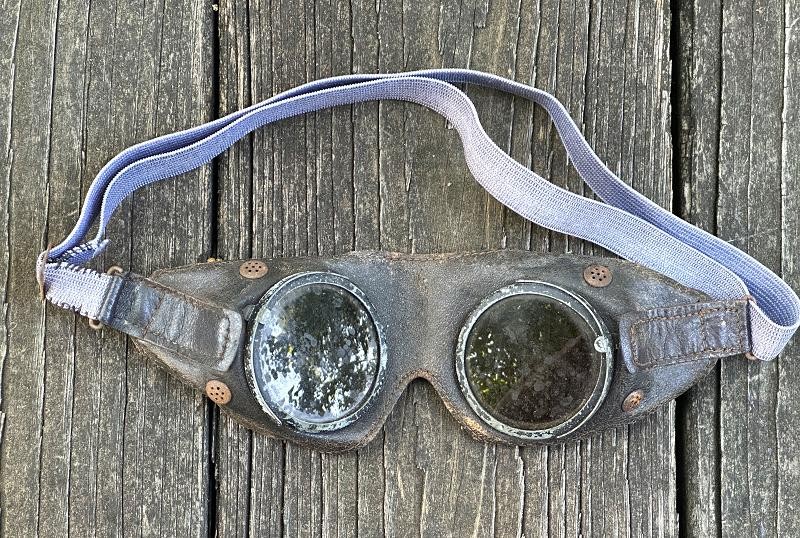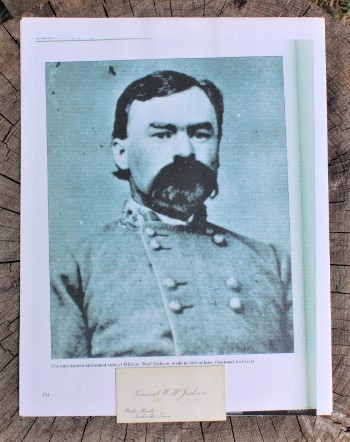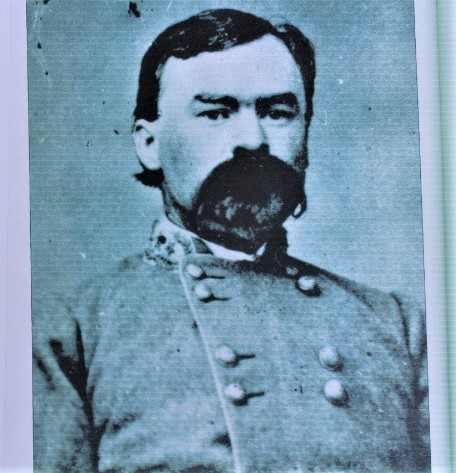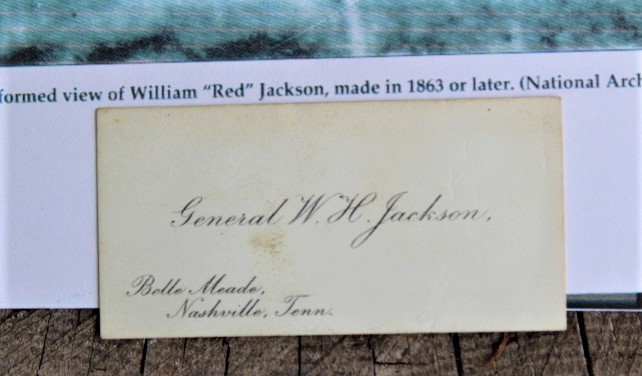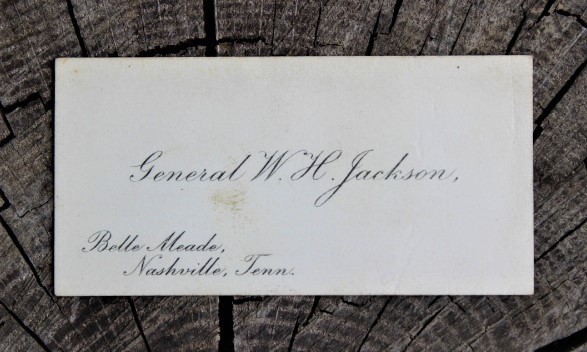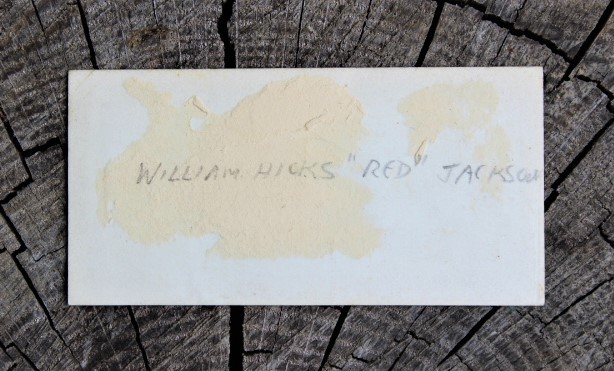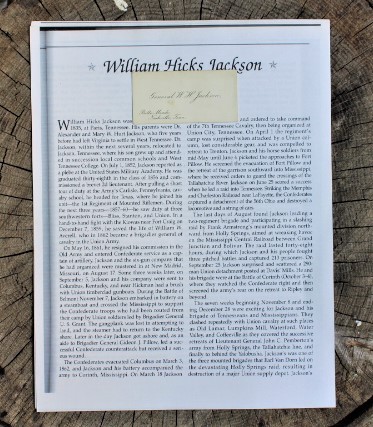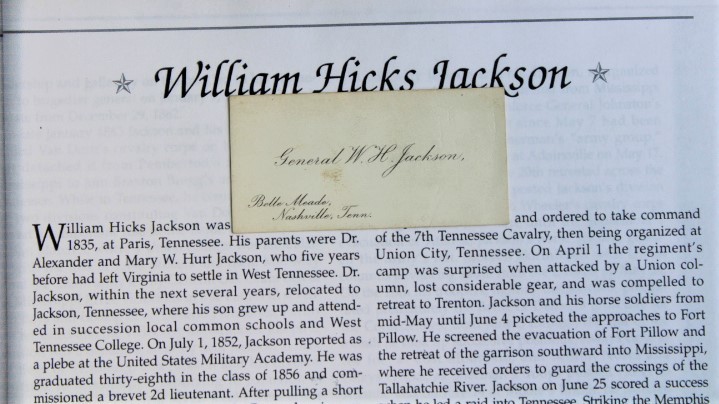Post War Calling Card General William H. Jackson
Item #: WR435
Click on an image to enlarge
This is a calling card of Confederate General William Hicks Jackson from the post Civil War era. The card also comes with a photo copy of the only known image of Jackson in uniform and a biography of the General. Calling cards were very popular in the 19th century, as they served as an important means of communication with the socially elite. These cards served to announce that a visit had been made to someone's home or place of business by the person leaving the card. Normally a calling card would arrive at the originators home within a couple of days, often with a brief message on the back of the card to arrange a visit. There were certain protocols to be observed when leaving a calling card. For example, if you arrived home to find a calling card at your residence and the upper right hand corner of the card was folded over, that indicated that the person leaving the card had done so in person. Calling cards in sealed envelopes represented the same message, that the person leaving the card had attempted to deliver it in person. If no acknowledgement of the card was made, or if the sealed envelope was returned that meant the party requested had rejected the invitation for a social visit. Folding of different corners meant different things. For example, the folded lower left hand corner was meant to express condolences. A folded upper left hand corner was used to convey congratulations, and a folded lower right hand corner showed that the caller was leaving on a long trip and did not expect an acknowledgement of the card. Homes of the socially elite often had silver trays in the entrance foyers or halls so visitors could leave their cards. The most prominent visitors had their cards displayed on top, to show the homes social connections. Both men and women used calling cards, and each gender had separate rules to observe when using them. Newspapers even printed articles on calling card etiquette. Men's cards were generally were long and narrow so they could be carried in a breast pocket. Women's calling cards tended to be a bit larger, and during the Victorian era were very ornate and embellished. By the beginning of the 1900's calling cards began to decline in popularity. General Jackson's calling card measures approximately 3" wide and 1 1/2" tall. It is made of simple white card stock and has General W. H. Jackson, in old English script letters on the front. In the lower left corner is the General's famous address of Belle Meade, Nashville, Tenn. The back of the card has been printed in pencil "WILLIAM HICKS "RED" JACKSON". William H. Jackson was born 1 October, 1835 in Paris, Tennessee. His father, Alexander, was a doctor and his mother Mary the daughter of a Baptist preacher. Jackson graduated West Point in 1856 and was brevetted a 2nd Lieutenant in the US Army. He studied Cavalry tactics at Carlisle Barracks in Pennsylvania, and was assigned to the Regiment of Mounted Rifles. He served at Ft Bliss Texas and the New Mexico territory. When Tennessee seceded from the Union Jackson resigned his commission on 16 May, 1861. He returned to Tennessee and joined the Confederate Army. Jackson would serve in the Western theater of the Civil War. He served under the commands of General's John Pemberton, Joseph Johnston and would end the war as a Brigadier General in command of all Tennessee Cavalry units in Lieutenant General Nathan Bedford Forrest's Corps. At the war's end General Jackson served as parole Commissioner for soldiers from Mississippi and Alabama. Jackson returned to Tennessee after the war and managed his father's cotton plantation. He married Selene Harding in 1868. Her father, William Harding, was the owner of the 5300 acre Belle Meade Plantation located near Nashville, Tennessee. In 1886 Jackson and his brother Howell, who had also married into the Harding family, took over control of the Belle Meade Plantation after the death of their father in law. With his brother, they turned the plantation into the nation's leading thoroughbred breeding center. The plantation was a highly successful operation, and was the destination of such notable guests as President Grover Cleveland, deceased President Abraham Lincoln's son Robert Todd Lincoln, President Ulysses S Grant, General William T. Sherman and General Winfield Scott Hancock to name a few. William Hicks Jackson died in 1903 at the Belle Meade Plantation and is buried there in the family cemetery. This calling card of a hard riding, hard fighting Tennessee Cavalry General could be the center piece of your card collection.
Shipping Weight:
1 lb
Your Price $275.00 USD
Sorry we are not accepting on line orders at this time. If you are interested in an item please contact me at 615 717 7792 or email me at mwkiser07@gmail.com.
If you have ordered or are considering ordering an antique weapon or artifact from our website please be advised that these artifacts and antique weapons are sold strictly as collectible antiques.
We strongly recommends that these artifacts be enjoyed and appreciated for their historical significance and not ever fired. By ordering you are acknowledging these facts, warnings and assume full responsibility for your personal actions with regard to them.
We DO NOT sell modern firearms , all our inventory is pre 1898 and are classified by the ATF as antiques and require no government paperwork to own.
